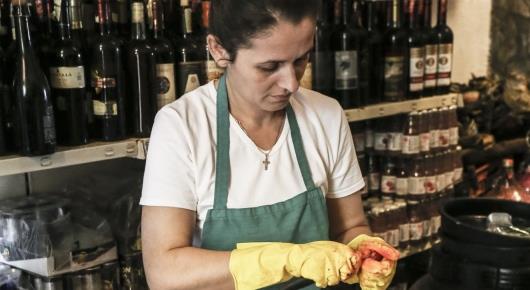FAO value chain study points to opportunities for Albanian women

Starting or participating in an agrifood business could make good sense for women in poor rural areas of Albania. A new study commissioned by FAO – and presented at a conference here today – identifies several business ideas and examines value chains and markets with potential for improving women’s incomes.
Albania today is classed as a middle-income country, but economic progress has not been equally distributed. Long-term unemployment persists at a rate of 10-11 percent of the workforce, is higher in rural areas and highest of all among rural women.
Using a gender-sensitive value chain approach, the study selects three value chains for deeper analysis: production of medicinal aromatic plants, beekeeping, and gourmet and traditional food. Also reviewed are opportunities in tourism and aquaculture.
Beekeeping and honey production are increasingly practiced by small farmers in Albania, but on a small scale. Demand at home and abroad continues to grow, but there is a need for better product packaging, promotion and distribution. Marketing and distribution activities could offer income diversification opportunities for women, the study suggests.
Demand for medicinal aromatic plants is increasing worldwide, due to changes in technology, lifestyle and customer attitudes. The study identifies possible export opportunities for Albanian sage, essential oils, wild tea and other products used in the flavor, pharmaceutical, personal care and other sectors.
There is a growing demand and potential for traditional and gourmet foods, the study found. Products include fruit jams, homemade “dromka” pasta, dried fish, traditional pie, pickles, dried organic apple rings and mulberry and plum “raki,” a local alcoholic beverage. For now, however, these foods lack appropriate packaging and are produced in low volumes, affecting cost-effectiveness.
In each business area, the researchers examined production, market data and market trends. Value chain analysis covered value chain actors, mapping, supply and marketing channels, value added, and business models with potential for economically empowering rural women.
“We believe that the data collected, and the rigorous analysis of value chains and markets, will be useful to policy makers and development agencies in supporting women’s economic empowerment,” said FAO gender specialist Aroa Santiago Bautista. “It provides a firm basis for designing strategic, informed, results-oriented interventions.”
The study was carried out under an FAO project on advancing rural women’s economic empowerment through income diversification. In line with national priorities, the long-term objectives are to close the “gender gap” in rural areas, improve the livelihoods of rural populations, reduce poverty, and develop rural areas in sustainable ways.
22 February 2017, Tirana, Albania
